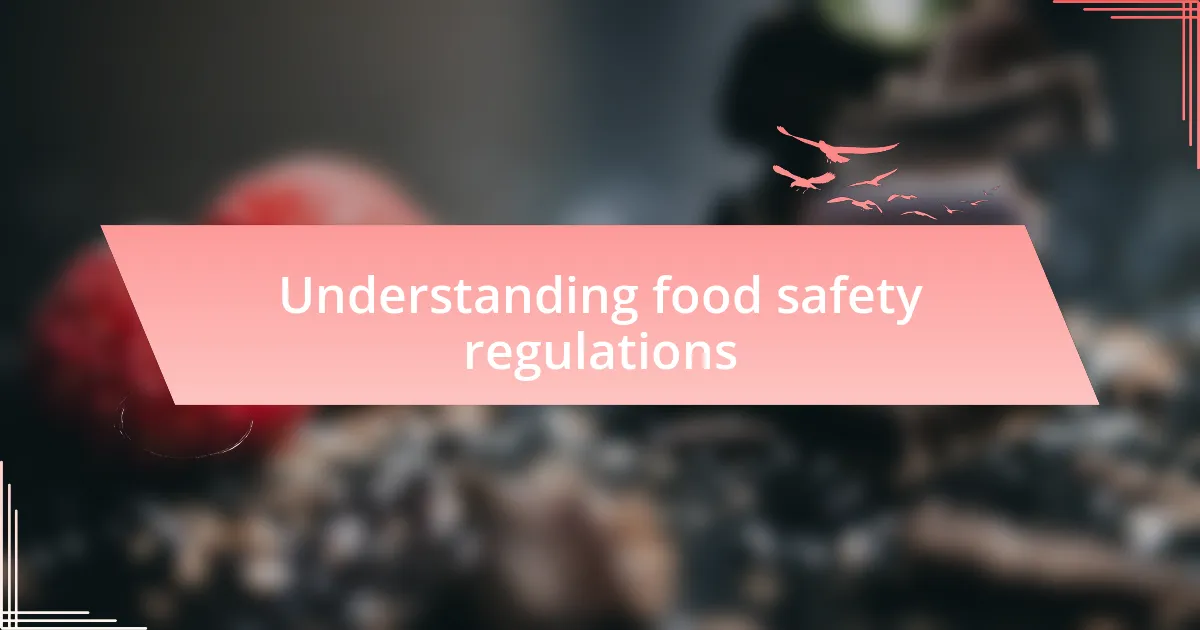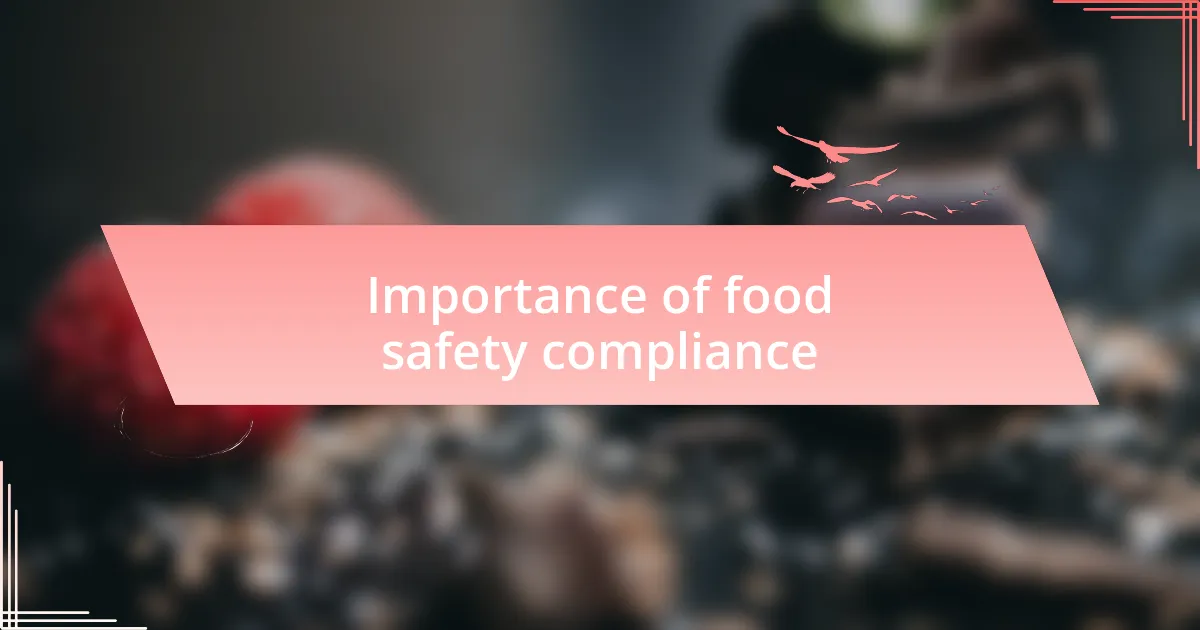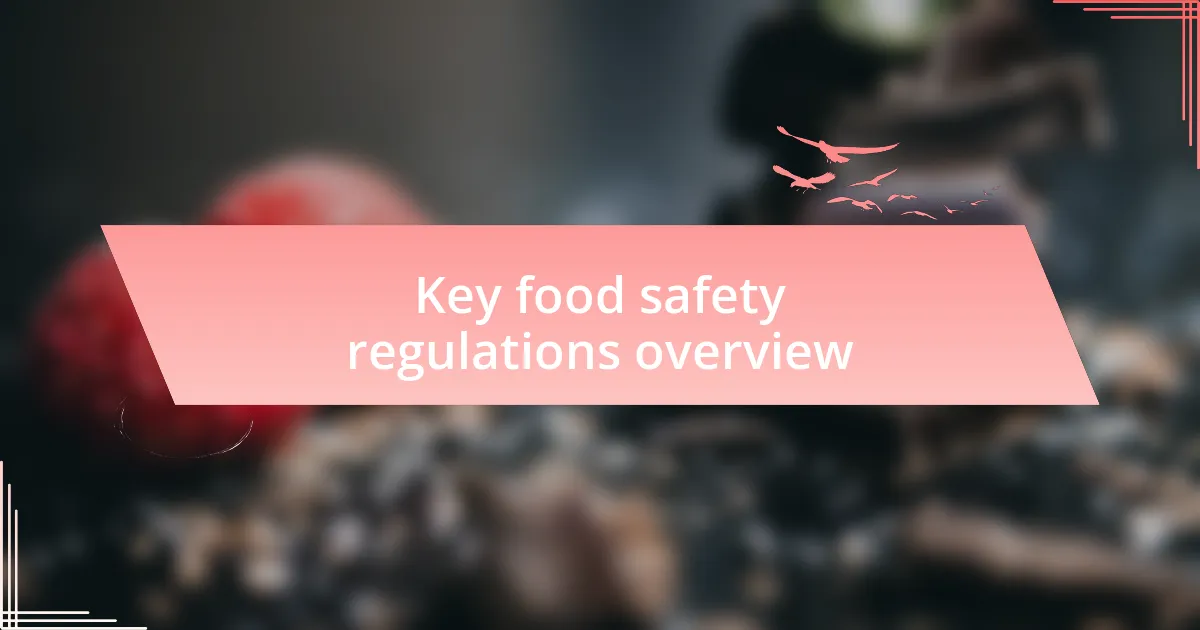Key takeaways:
- Understanding food safety regulations is essential for customer health and business compliance, requiring ongoing education and adherence to local, state, and federal guidelines.
- Compliance fosters a culture of accountability among staff, enhancing operational standards and protecting against financial and reputational risks.
- Proactive planning, effective communication, and meticulous record-keeping are critical strategies for navigating food safety challenges and ensuring business longevity.
- Collaboration with other food business owners and empowering team members can significantly improve compliance practices and create a supportive safety culture.

Understanding food safety regulations
Understanding food safety regulations is crucial for anyone in the food business. It’s not just about compliance; it’s about protecting the health of your customers. I remember the first time I faced these regulations; the sheer volume of guidelines felt overwhelming. It made me wonder, how can anyone keep track of all these rules and ensure their business is compliant?
The various tiers of regulations can often feel like navigating a maze. Local, state, and federal guidelines may differ, and they can change frequently. I often find myself questioning if I’ve missed a critical detail or, worse, if I’m jeopardizing the safety of my customers. It’s essential to stay updated; for me, subscribing to industry newsletters has been a game-changer in keeping informed.
For me, understanding these regulations goes beyond reading the documents. It’s about the peace of mind that comes from knowing I’m operating safely. Take the time to delve into the specifics of food handling and storage requirements. When I implemented proper sanitation procedures based on these regulations, the positive feedback from my customers was immediate. It’s a reassuring reminder that prioritizing food safety not only ensures compliance but builds trust with those who enjoy your products.

Importance of food safety compliance
Ensuring compliance with food safety regulations is vital for the longevity of any food business. I learned this firsthand shortly after launching my first café when a routine inspection revealed minor violations. The anxiety I felt during that visit taught me that even small oversights can have significant consequences, both for consumer health and my reputation. Just think about it: how much would a single incident impact your business’s credibility?
The importance of food safety compliance extends beyond legal obligations; it cultivates a culture of accountability within your establishment. For example, after implementing training sessions for my staff on the latest safety standards, I noticed a remarkable increase in their confidence and diligence. I often encourage other food business owners to view these regulations as a framework for excellence rather than mere checkboxes. Doesn’t it feel rewarding when you see your team take pride in maintaining high standards?
Adhering to food safety regulations also shields your business from financial peril. There was a time when a competitor of mine faced hefty fines due to non-compliance, which eventually led to their closure. This incident served as a crucial reminder that overlooking these regulations can lead to costly consequences. It’s clear that compliance isn’t just about following rules—it’s essential for sustaining a healthy, thriving business.

Key food safety regulations overview
Food safety regulations are a multifaceted set of guidelines designed to ensure that food is safe for consumption. In my experience, understanding foundational regulations like the Food Safety Modernization Act (FSMA) can dramatically shift how a business operates. This act emphasizes prevention and requires food businesses to adopt a proactive stance; I’ve actually found that waiting until after the fact is never a wise approach. Have you ever wondered how many lives are directly impacted by our food safety decisions daily?
Another critical regulation encompasses Hazard Analysis Critical Control Points (HACCP). By identifying points in the food production process where contamination can occur, I was able to streamline operations at my café. When I applied HACCP principles, I not only reduced the risk of foodborne illnesses but also laid down a clear protocol that my staff could easily understand and execute. Isn’t it fascinating how a systematic approach can enhance safety and serve as a strong training tool for new employees?
Lastly, local and state health regulations play an essential role in shaping compliance expectations. The guidelines often vary significantly depending on location, making it imperative for me to remain updated with my local health department. I remember the time I learned about a change in temperature requirements for storing food in my county, which prompted me to invest in new thermometers. Adjusting to these regulations can feel daunting, but isn’t it empowering when you know you’re protecting both your customers and your business?

Common challenges in food safety
Navigating food safety can sometimes feel like walking a tightrope, especially with the ever-evolving regulations. I remember a time when I miscalculated the staff training schedule—our team wasn’t fully trained on the new allergen management policies. The tension in the kitchen was palpable as we rushed to correct this oversight before a large catering event. Have you ever felt that knot in your stomach when you realize something critical was overlooked?
Another challenge I faced was sourcing compliant suppliers. I once partnered with a distributor who had not updated their food safety certifications. It was a wake-up call when I discovered that their practices didn’t align with the new FSMA requirements. This experience taught me the importance of due diligence and having a robust vetting process for partners. It’s amazing how much peace of mind comes from knowing that everyone in your supply chain shares your commitment to safety.
Lastly, I often grapple with the proper documentation and record-keeping required by health authorities. At one point, I found myself buried under a mountain of forms, unsure if I was meeting all the necessary standards. I nearly missed the deadline for our annual inspection because of disorganization. It’s hard to convey the mix of frustration and relief when I finally established a streamlined system for tracking all necessary records. Have you ever felt overwhelmed by paperwork, only to find clarity in simplifying your process?

Personal strategies for navigating regulations
Staying proactive has been key for me when it comes to navigating food safety regulations. Each month, I dedicate a couple of hours to review updates on local health codes and industry standards. I found that subscribing to food safety newsletters helps me stay informed; it’s like having a backstage pass to changes that might affect my business. Do you ever feel overwhelmed keeping up with all the updates?
I also emphasize team empowerment in my strategy. By creating an environment where team members feel comfortable discussing compliance and safety issues, I’ve fostered a culture of transparency. I recall an instance when one of my line cooks alerted me to a labeling oversight on a product. Instead of feeling defensive, I praised their initiative, which encouraged others to speak up about potential pitfalls. How do you encourage dialogue about safety in your workplace?
Lastly, I’ve learned the value of connecting with other food business owners. Forming a small network has opened avenues for sharing compliance tips and experiences. After attending a workshop with fellow chefs, I discovered best practices for inspections that evolved my approach entirely. Have you ever thought about how collaboration can ease the burden of regulatory navigation?

Lessons learned from my experience
When I first ventured into the food business, I underestimated the importance of meticulous record-keeping. One late-night inspection caught me off guard because I couldn’t quickly find critical paperwork. That experience taught me that staying organized isn’t just beneficial—it’s essential. Have you ever faced a moment where one small oversight had significant repercussions?
I’ve also found that training sessions bring much more than just compliance. During one such session, I noticed my staff transforming from reluctant participants to enthusiastic contributors. It was enlightening to see how knowledge empowered them to take ownership of their roles. This made me realize the potential we unlock when we invest in our team’s education. Do you think engaging your staff in continuous learning could enhance your operations?
A major lesson surfaced when I faced a recall situation. It was chaotic, but I learned the value of having clear communication protocols in place. Our swift action saved us from a more significant disaster, and I felt an overwhelming sense of relief knowing we were prepared. This taught me that proactive planning is vital; it can make all the difference in a crisis. Have you considered what steps you’d take if faced with a similar challenge?